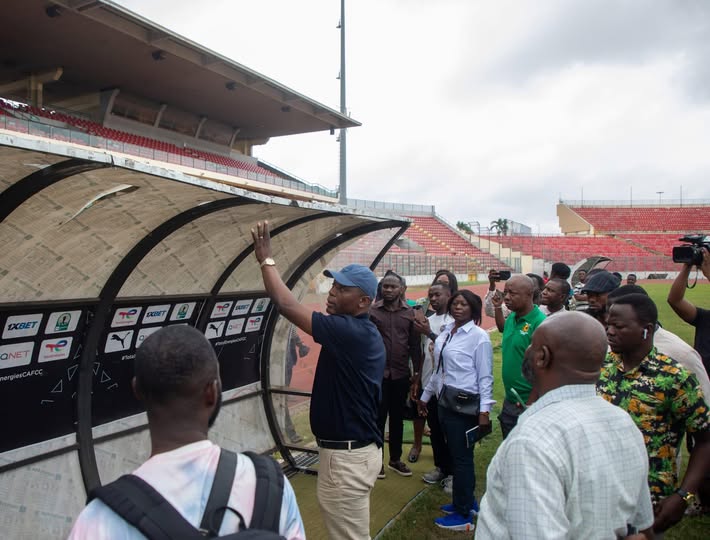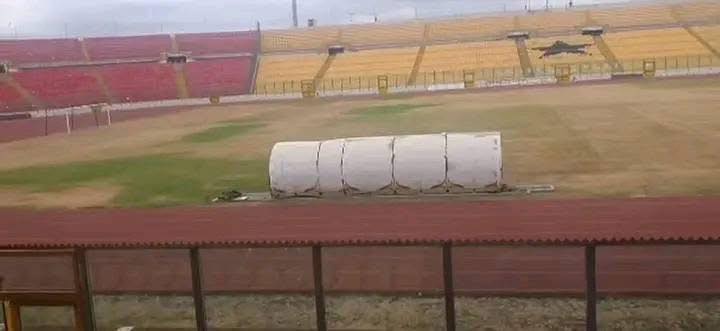Kotoko in Confederation Cup: Frank Boahene, a renowned Green Grass Technologist, recently highlighted the pressing need for river water to sustain the pitch of Baba Yara Stadium in Kumasi.
According to Boahene, the stadium’s grass, which is vital for hosting important matches, requires regular irrigation from river sources to thrive.
This revelation comes as the stadium’s pitch was removed on July 30, 2025, for essential regrassing ahead of the upcoming CAF Confederation Cup preliminary round.
With Asante Kotoko set to play in this prestigious competition, there is growing concern over whether the pitch will be ready in time.
Importance of River Water for Grass Growth
In a Kessben FM report, Boahene explained that the grass on the stadium’s pitch is very delicate and requires a consistent water supply. River water, due to its mineral content, is ideal for the nourishment and growth of the grass.
In contrast, municipal water is not rich in the nutrients necessary for optimal grass health, which is why relying on river water is crucial.
This information underscores the complexity of maintaining high-quality pitches for football teams, especially for a high-profile venue like Baba Yara Stadium, which is critical to the success of Asante Kotoko and the local football community.
Babayara Stadium Re-grassing
The recent decision to remove the old pitch and begin regrassing the field comes with significant time pressure. The stadium must be ready in time to host Asante Kotoko’s upcoming CAF Confederation Cup preliminary round matches later this month.
The team’s participation in this continental competition is of great importance, not only for the club but also for Ghanaian football as a whole.
Any delay or issue with the pitch could jeopardize the match’s success or even cause a shift in venue, which would have logistical and financial repercussions for the team and organizers.

Challenges of Pitch Maintenance
The maintenance of sports facilities in Ghana has long been a subject of concern. Both the Kumasi Baba Yara Stadium and the Accra Sports Stadium have faced their share of maintenance challenges in recent years.
These stadiums, which are supposed to serve as premier sports venues, often struggle to meet the high demands of modern sports competitions due to poor upkeep, outdated infrastructure, and lack of proper funding.
The Kumasi Baba Yara Stadium’s pitch is not the only area in need of attention. The stadium’s general infrastructure, including seating, lighting, and locker rooms, requires continuous maintenance to ensure it meets international standards.
Unfortunately, such maintenance is often neglected, leading to a diminished experience for both players and spectators.
Similarly, the Accra Sports Stadium, another key venue for Ghanaian sports, has also faced several issues. From the deteriorating quality of its pitch to challenges with its seating arrangements, the stadium has failed to keep up with the growing demand for top-tier facilities.
The failure to address these maintenance issues regularly means that both fans and athletes often face substandard conditions, which could eventually deter international events from being held in the country.
The Need for Sustainable Solutions
Frank Boahene’s concerns about river water highlight a deeper problem in maintaining Ghana’s sporting infrastructure. The reliance on natural resources such as river water is not a long-term sustainable solution.
To ensure the longevity of pitches and the success of upcoming events, the government and relevant sporting authorities must prioritize investment in modern technology and sustainable solutions.
These may include rainwater harvesting systems, state-of-the-art irrigation techniques, and partnerships with private stakeholders to ensure proper funding for regular maintenance.
Additionally, a broader overhaul of the maintenance culture is necessary. Sports venues should not only be fixed when issues arise but should be part of a long-term maintenance plan.
Training local experts in the field of sports turf management could also be an important step toward ensuring that Ghana’s stadiums can stand the test of time and continue to host international events such as the 2025/26 CAF Confederation Cup preliminary round matches with pride.
A Call for Action
As the clock ticks down to the upcoming CAF Confederation Cup preliminary round, the urgency of regrassing Baba Yara Stadium is palpable. While the efforts to restore the pitch are underway, there remains a great deal of work to be done in terms of maintaining sports infrastructure across Ghana.
The challenges faced by both Baba Yara and Accra Sports Stadiums call for immediate action, not just to ensure that these venues are fit for international competitions but to foster the growth of sports in the country as a whole.
For Ghana to continue making strides on the global sports stage, it must invest in sustainable, long-term solutions for stadium maintenance.
READ ALSO:
Is Nana Apinkrah the man to lead Kotoko to continental glory?








Discussion about this post